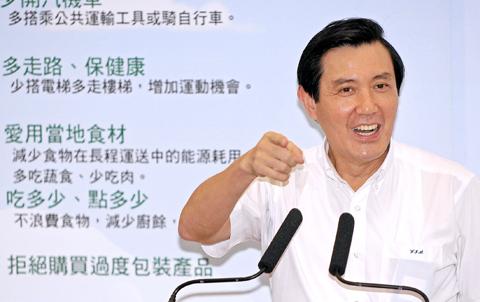On World Environment Day yesterday, nuclear power was listed as an option for the government’s carbon-free energy program as the Cabinet approved sustainable energy policy guidelines.
The move indicated that the new Chinese Nationalist Party (KMT) administration will run counter to the statutory goal of establishing a “nuclear-free homeland,” which the former Democratic Progressive Party (DPP) government pushed through in the Environment Basic Law (環境基本法) in 2002.
Yeh Huey-ching (葉惠青), the director-general of the Ministry of Economic Affairs’ (MOEA) Bureau of Energy, which drew up the draft guidelines, sidestepped that question, saying that “problems related to nuclear power require further deliberation.”

PHOTO: SAM YEH, AFP
Asked about the government’s position on the nation’s three nuclear power plants and the new Fourth Nuclear Power Plant, Yeh said: “We intend to use every means available to reduce carbon emissions. [Nuclear] is the last option to be considered, the last choice.”
Premier Liu Chao-shiuan (劉兆玄) issued a directive at yesterday’s Cabinet meeting to speed up the completion of the Fourth Nuclear Power Plant, to find the best solution to handle nuclear waste and to better communicate with the public about the nuclear power issue, Yeh said.
Yeh said that the percentage of the nation’s electricity derived from nuclear power would not be determined until a planned national energy conference in the latter half of the year.
Currently nuclear power generates 17 percent of Taiwan’s electricity.
Taiwan was the first country in Asia to announce a plan to build a “nuclear-free homeland” when it introduced the law in 2002, a joint decision by the KMT and DPP that sought to end the political standoff that arose from the DPP’s decision in 2000 to halt the construction of the Fourth Nuclear Power Plant.
The plant is scheduled to go on-line late next year.
Based on the law, the former DPP government established a Nuclear-Free Homeland Promotion Commission to publicize the policy and had the MOEA draw up a statute to bring forward the phasing out of the three existing nuclear power plants.
Under its sustainable energy policy guidelines, the KMT administration has vowed to pursue energy efficiency, clean energy and energy stability to create a “win-win-win” situation for energy production, the environment and economic growth.
In terms of energy efficiency, energy intensity — a measure of energy consumption per GDP — should be cut by 20 percent below 2005’s levels by 2015 and further lowered to 50 percent below those levels by 2025, the guidelines said.
The government would be required to increase the percentage of electricity generated by low-carbon fuel to 55 percent of the nation’s requirements by 2025 from the current level of 40 percent and the energy generated by renewable carbon-free sources from the current level of 5 percent to 8 percent by 2025.
“These are all demanding objectives,” Yeh said.
Yeh said that the government would push for the passage of regulations that aim to reduce carbon dioxide emissions, encourage renewable energy production and impose an energy tax.

ANOTHER EMERGES: The CWA yesterday said this year’s fourth storm of the typhoon season had formed in the South China Sea, but was not expected to affect Taiwan Tropical Storm Gaemi has intensified slightly as it heads toward Taiwan, where it is expected to affect the country in the coming days, the Central Weather Administration (CWA) said yesterday. As of 8am yesterday, the 120km-radius storm was 800km southeast of Oluanpi (鵝鑾鼻), Taiwan’s southernmost tip, moving at 9kph northwest, the agency said. A sea warning for Gaemi could be issued tonight at the earliest, it said, adding that the storm is projected to be closest to Taiwan on Wednesday or Thursday. Gaemi’s potential effect on Taiwan remains unclear, as that would depend on its direction, radius and intensity, forecasters said. Former Weather Forecast

As COVID-19 cases in Japan have been increasing for 10 consecutive weeks, people should get vaccinated before visiting the nation, the Centers for Disease Control (CDC) said. The centers reported 773 hospitalizations and 124 deaths related to COVID-19 in Taiwan last week. CDC Epidemic Intelligence Center Director Guo Hung-wei (郭宏偉) on Tuesday said the number of weekly COVID-19 cases reported in Japan has been increasing since mid-May and surpassed 55,000 cases from July 8 to July 14. The average number of COVID-19 patients at Japan’s healthcare facilities that week was also 1.39 times that of the week before and KP.3 is the dominant

The Chinese Communist Party’s (CCP) working group for Taiwan-related policies is likely to be upgraded to a committee-level body, a report commissioned by the Mainland Affairs Council (MAC) said. As Chinese President Xi Jinping (習近平) is increasingly likely to upgrade the CCP’s Central Leading Group for Taiwan Affairs, Taiwanese authorities should prepare by researching Xi and the CCP, the report said. At the third plenary session of the 20th Central Committee of the CCP, which ended on Thursday last week, the party set a target of 2029 for the completion of some tasks, meaning that Xi is likely preparing to

US-CHINA TRADE DISPUTE: Despite Beijing’s offer of preferential treatment, the lure of China has dimmed as Taiwanese and international investors move out Japan and the US have become the favored destinations for Taiwanese graduates as China’s attraction has waned over the years, the Ministry of Labor said. According to the ministry’s latest income and employment advisory published this month, 3,215 Taiwanese university graduates from the class of 2020 went to Japan, surpassing for the first time the 2,881 graduates who went to China. A total of 2,300 graduates from the class of 2021 went to the US, compared with the 2,262 who went to China, the document showed. The trend continued for the class of 2023, of whom 1,460 went to Japan, 1,334 went to